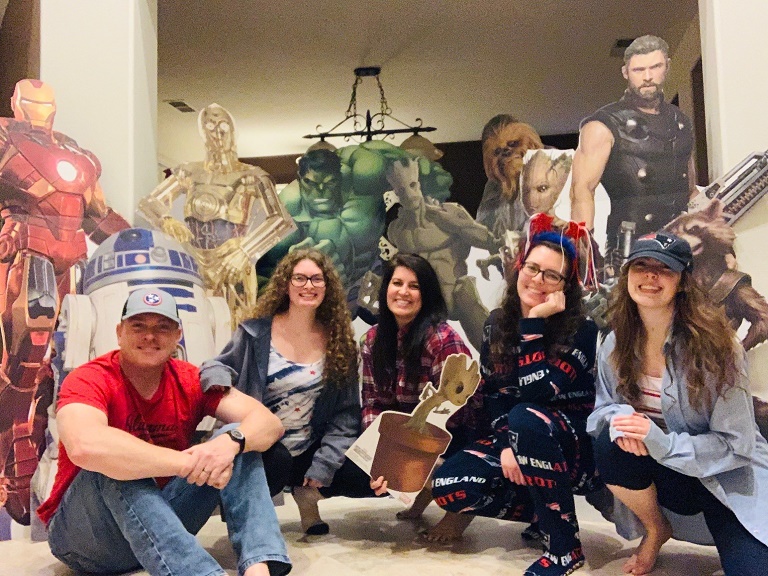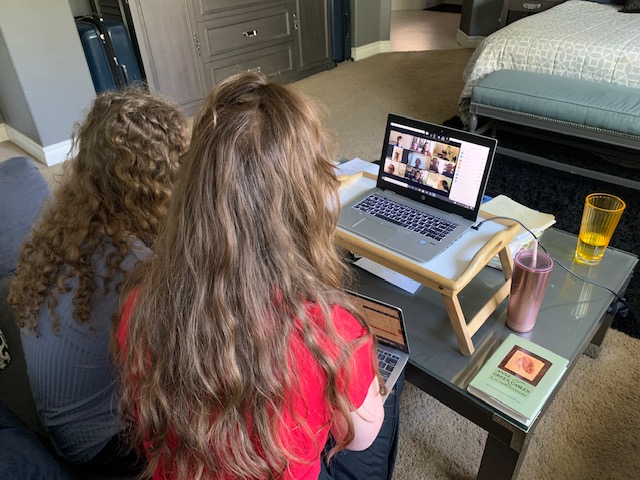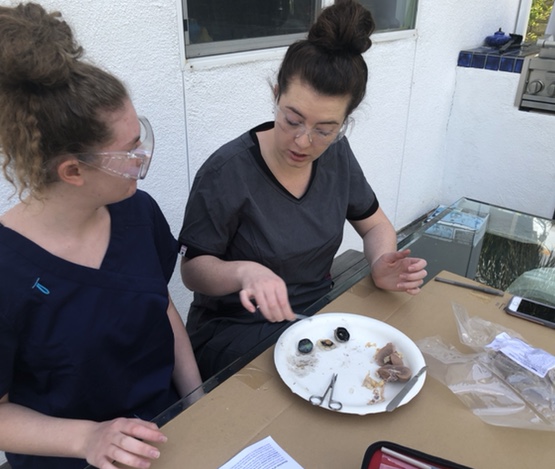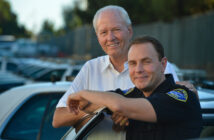For families across the nation, the school bell now rings in their living room and the classroom is held in front of a computer screen.
The teachers? Well, that’s up to the parents now.
As parents and children face a “new normal” due to Covid-19, part of this includes finishing the school year – at home.
We had a chance to speak with Pasadena Police Sergeant Anthony Burgess and his wife Michele, who have home schooled their three daughters, successfully, for the last 13 years.
Their daughters, Samantha, 23, Jayna, 21 and Sydney, 14 have prospered academically, but also within their family dynamic.
“Homeschooling is a lifestyle choice, one we made 13 years ago as we evaluated the cost of private schooling, taking advantage of your work schedule and the opportunity to choose what and how our children learn,” said Michele Burgess. “We have had the privilege of teaching every grade K-12. It has been one of the greatest adventures of our lives.”
Sgt. Burgess is the family’s history, social studies and film studies teacher and his wife Michele and teachers from the home school programs handle the other subjects – from dissecting a sheep’s eye to traditional English Lit.
“We recently finished a 32-week course on the Civil War … needless to say, this small-sized group allows for lots of one-on-one teaching so subject-mastery is an attainable goal,” said Sgt. Burgess. “One rarely can reach this in public schools.”
Sgt. Burgess and Michele were able to offer insight on what homeschool looks like for them and how they’ve seen their children educationally thrive.
- What does a day look like in your household for home school?
With the pandemic, the day is still structured, but team efforts have to be tackled with technology…. Zoom, email, cell phone conversations, and Google Classroom. The kids tend to perform better in the morning, so we have maintained a fairly traditional school schedule…starting school around 8:30 am.
We have created a flexible schedule because, ordinarily, we have classes/outings/activities outside the home. This may mean doing a subject or two in the morning and then returning to schoolwork later in the afternoon or completing assignments on the weekend. The key to successful homeschooling is FLEXIBILITY.
2. What made you decide this was the best option for you and your family?
We wanted to have an active role in what and how our children learned. We wanted to introduce them to topics that go beyond the traditional subjects taught in brick and mortar schools. We wanted to travel freely and allow our children to experience the world around them. We wanted to spend as much time with our children as possible while they were children. Parents get about 18 summers with their kids…we wanted more. Private schooling has been beneficial in the past, but cost must be taken into account- especially with three daughters.
3. Does it take a certain type of structure/personality type to create a successful home school experience?
Homeschooling looks different in every home and its success has many different measures. There’s not one “right” way to homeschool. Patience is important as is the knowledge of how to deliver content to the specific type of learner…. Visual learning, audio learning, and/or kinesthetic learning. Ultimately, if you invest time and your focus into your children and their educational interests, incorporating whatever learning tools you can get your hands on, your experience will be successful.
4. As parents across the globe start home schooling, do you and your wife have any advice for parents and first responders who now face having to educate their children while also working and being under stress?
Choosing to homeschool and having it thrust upon you are two very different things.
In this time of chaos, I think it is important for parents to remember to give yourself grace – a lot of it!
Your children will be fine, academically, in spite of this shift in their educational process. They now have the people who love them most educating them day by day, so they will be fine…and in many cases, even better than fine. Even if you doubt your skills to teach your child, you have to be confident in the fact that these little people will soak up whatever little nuggets you share with them each day.
Know that a school day does not have to be 7 hours long, for most students…and definitely not for K-8. If your day includes a full time job and/or a lot of stress, sprinkle your schooling throughout the day. Read together in the morning (language arts)…while preparing lunch talk about the origins of some of the ingredients and then task your child with finding those spots on a map or globe (social studies)…shake out the wiggles in the afternoon by going outside and skip counting while bouncing a ball (math)…choose an educational program to watch together – “The Who Was? Show” or “The Magic School Bus” on Netflix (science) and then have your child write a few sentences about it or draw a picture and present it (writing/comprehension/communication).
You can easily add a couple more independent seat work tasks to this type of day and your child will have experienced a great day of school. I think the main goal is to have your children engaged in learning without them even knowing it. It’s really about a change in perspective about education. Everything you do as a parent all day long can be a learning experience for your child. And remember that it doesn’t have to just be in the main four school subjects. Preparation, organization, and having resources are key. Once you know what you want to teach for the upcoming year, gather your teaching material and master it yourself before you begin. For things like upper math, Spanish, Chinese, Chemistry, or anything you can’t handle, find tutors so distance learning can be developed.
Also, be happy that you have the flexibility to teach your children the way you want. Look at your child’s future and find out how to gear his/her learning toward their likes/career goals. As much as possible, support what the child is good at and try to direct the education to that type of field
5. Any last words of wisdom for families embarking on homeschooling?
Love for your kids and preparation is key.
What is your gift that you can teach your children? Can you teach leadership? Can you teach essay writing? Can you teach math and history? Can you teach Spanish? Can you adequately prepare your kids for the future? We all have our strengths and weaknesses. In this crazy time, leverage the resources around you. What skill sets do the people in your life have? Can a grandparent, aunt/uncle, cousin, sibling, neighbor, virtually assist you at this time?
FaceTime/Zoom/Marco Polo provide fun opportunities for children of all ages to interact with others to learn. If you are working, ask someone in your life to interact with your child for you while you take that call or get through some emails.
If nothing else, your child will be learning about technology and reinforcing relationships.
Don’t be hesitant to use video games during this time. There are many that are educational and could very much engage your child.
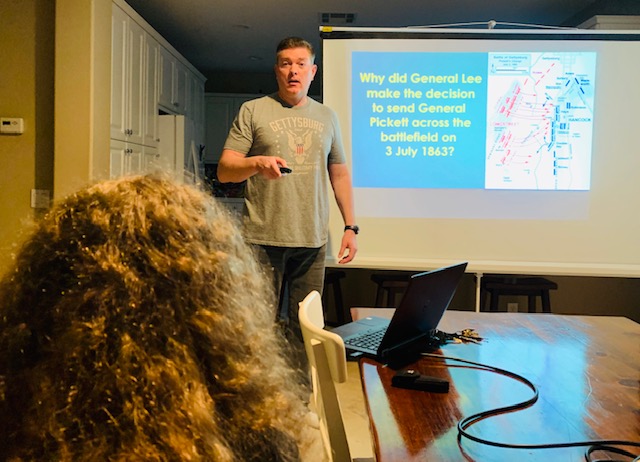
Sgt. Burgess is the family history teacher, who loves to go in-depth, something private and public schools are not able to do. Photo courtesy, Burgess Family.
6. Can your kids share a comment on why they think homeschool has been a success for them?
Sydney Burgess, age 14: My mom and dad have played a huge role in why school is so enjoyable for me. My mom is always there for me when I need homework assistance, but is mostly involved in my math studies. She is an amazing and smart woman and I could not ask for a better math teacher. My dad loves history! He has taught me and my cousin all about the Civil War. After the class, we travelled to Gettysburg to see this battle site first hand. It brought my studies to life. We’ve also visited many other Civil War battlefields in Tennessee and Virginia. He also taught me and some of my friends Film Studies. We watched films and then analyzed them. Since the coronavirus has happened we have not been able to do the many things we enjoy, such as: Disneyland days, getting together with friends, and above all…traveling! Our family loves to travel! The thing about homeschooling is the freedom that comes with it.
Samantha Burgess, age 23: I have always loved school, but homeschooling really afforded me opportunities I wouldn’t have had otherwise. I completed two years of college as a high school student and because of that was able to completely focus on my Pre-Medicine degree once I went off to college. I also felt so much more prepared in the world of academics because I had learned best practices for studying and worked to perfect skills that others may not focus on until much later in their academic careers.
Jayna Burgess, age 21. Being homeschooled allowed me the time and flexibility to explore subjects I had an interest in at an early age, namely creative writing. This early exposure helped shape me into a diligent and independent learner who enthusiastically pursued my passion academically and professionally.
 Behind the Badge
Behind the Badge

